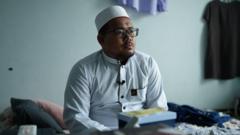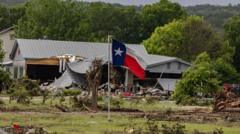The earthquake that struck Myanmar has devastated the local Muslim community, leading to significant loss of life during a time of prayer. Soe Nay Oo, a former imam, grapples with the heart-wrenching loss of loved ones, while ongoing conflict complicates rescue and burial efforts in the region.
Tragedy Strikes Myanmar's Muslim Community as Earthquake Claims Lives During Ramadan

Tragedy Strikes Myanmar's Muslim Community as Earthquake Claims Lives During Ramadan
A powerful earthquake in Sagaing, Myanmar, has claimed the lives of around 170 worshippers at three mosques, prompting profound grief among family members and the global community.
In a harrowing turn of events, a catastrophic earthquake rocked the Sagaing region of Myanmar last Friday, claiming the lives of approximately 170 worshippers gathered at their mosques for Ramadan prayers. The quake, which struck during the sacred time when Muslims participated in their last Friday prayers before the celebration of Eid, caused devastating destruction, particularly to the five mosques in the central city.
Former imam Soe Nay Oo, who fled Myanmar after the 2021 coup and currently resides in Thailand, felt the tremors in Mae Sot, only to learn that many of his friends, relatives, and former congregation members perished in the disaster. As rescue operations unfolded, he found himself grappling with the overwhelming grief of losing such a significant part of his community. "I can't hold back my tears when I talk about this," he shared emotionally.
While the overall death toll from the quake exceeds 2,700, hundreds of victims were reported to have died in the mosques, with an estimated 500 Muslims lost during the prayers. Eyewitnesses recounted the urgency and chaos as worshippers attempted to escape the collapsing structures, with many crumpling under the weight of debris. As survivors sought shelter amidst the rubble, food and basic necessities became scarce, further exacerbating the community’s suffering.
Soe Nay Oo has lost not only friends and congregants but also beloved family members, impacting his experience of grief deeply. One cousin's death, he described as "the most painful thing" he has ever experienced, alongside the loss of a close family friend and former assistant imam, whose absence has left a void in his heart. "Their memories keep coming back to me," he expressed, articulating the weight of sorrow.
The Muslim community in Sagaing has faced additional complications due to the region's ongoing military conflicts. The local cemetery remains inaccessible, necessitating the transportation of bodies to Mandalay for burial—a practice that contravenes Islamic tradition due to the importance of timely funerals. "It is saddening that we cannot bury our own families properly," Soe Nay Oo lamented.
As he hastily paused his human rights work in Thailand to assist in rescue efforts remotely, he grappled with survivor's guilt for not being there when it mattered most. With hundreds still in need, and many families desperate for information about their loved ones, Soe Nay Oo feels the urgency to facilitate aid distribution, despite the trauma he himself is facing.
In this somber time for the Muslim community in Myanmar, the grief of losing so many during Ramadan—a month dedicated to reflection and spirituality—serves to amplify the tragic loss and call for resilience and support from the global community.






















